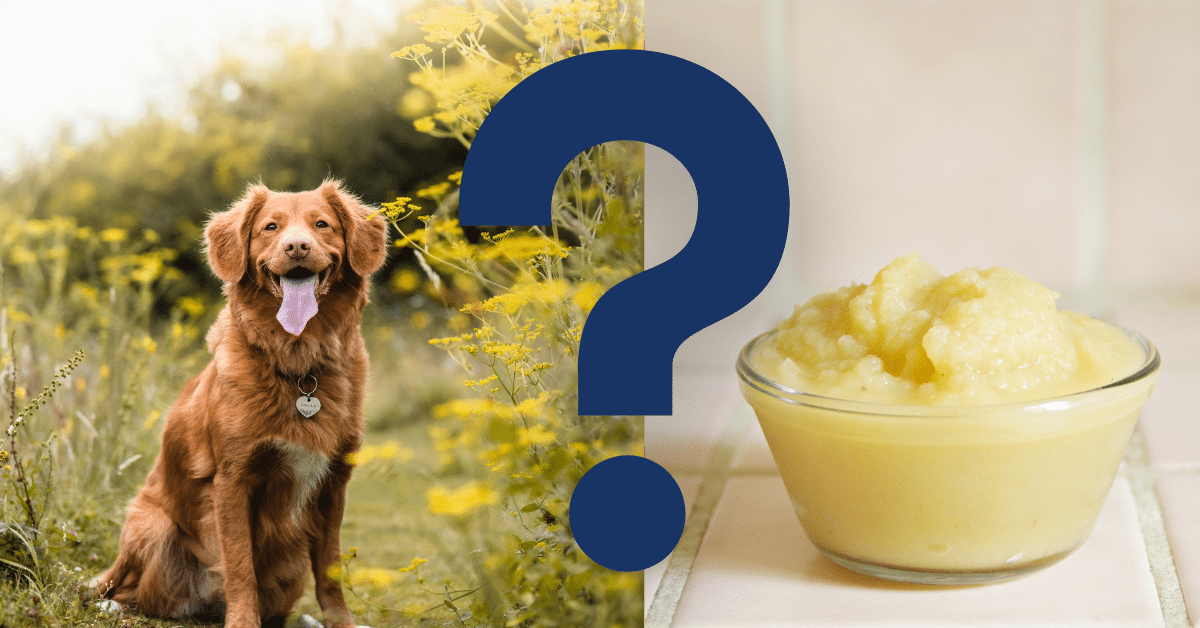Can Dogs Eat Applesauce? A Vet’s Opinion

Applesauce has all the nutrients of apples, but can you feed Applesauce to your dog?
As long as it doesn’t contain additional sugars, sweeteners, seasonings, or other potentially hazardous components, dogs can consume apple sauce within limits. Applesauce without additional sugars or sweeteners is an excellent source of antioxidants, fiber, and vitamins for dogs.
Benefits Of Apple Sauce For Dogs
Here are some additional details regarding the advantages of Applesauce for dogs:
- Applesauce is an excellent source of soluble fiber, which can help dogs avoid constipation and digestive control motions. In dogs, soluble fiber can also support normal lipid and blood sugar levels.
- Rich in nutrients: Applesauce is an excellent source of vitamins A and C, crucial for a dog’s immune system to remain strong. While vitamin C supports joint health and lowers inflammation, vitamin A is crucial for keeping healthy skin and fur.
- Applesauce includes antioxidants like flavonoids and polyphenols that can help shield cells from harm by free radicals.
- Free radicals can harm cells and play a role in the onset of chronic conditions like cancer, heart disease, and gout.
- Low in calories: Applesauce is a healthy substitute for high-calorie snacks because it is a low-calorie snack choice for dogs. This may be especially helpful for dogs who are overweight or prone to weight increase. Applesauce includes natural enzymes that can assist in decreasing lousy odor in dogs by breaking down oral bacteria.
- Applesauce has a high water level, which can aid in hydration and keep dogs hydrated. This can be especially helpful when it’s sweltering outside, or your dog isn’t getting enough water.
- Applesauce can be used as a food topping to make your dog’s everyday dishes tastier and persuade picky consumers to consume the food.
- Applesauce includes natural sugars, which can give dogs a fast energy source. It offers a natural energy source. This can be helpful when your dog requires a little additional energy or when there are more excellent physical exercise periods.
- Applesauce can help your dog’s teeth and lips stay healthy, supporting oral health. Applesauce’s natural enzymes can aid in the breakdown of plaque and tartar, which lowers the chance of oral issues like tooth decay and periodontal disease.
- Applesauce is a nutritious and low-calorie training food for dogs that can be used as a reward. This can be especially helpful if your dog is trying to lose weight or you want to cut back on the number of high-calorie snacks your dog consumes.
It’s critical to remember that while Applesauce can benefit dogs in some ways, a balanced meal rich in nutrients should always be the first choice. Additionally, Applesauce or other fruits might not be tolerated by dogs with diabetes, pancreatitis, or other medical problems.

How To Safely Give Applesauce To Dogs?
The following guidelines must be borne in mind if you want to give Applesauce to dogs without risk:
- Pick unsweetened Applesauce to avoid giving your pup any additional carbohydrates or sweeteners, which can be detrimental. Before giving commercial Applesauce to your dog, it is best to study the package closely, as some may also contain spices or other additives.
- Feed Applesauce to dogs sparingly, either as a treat or a topping for their meal. Consuming too much Applesauce can cause intestinal problems for your dog, such as diarrhea.
- Apples should be sliced into tiny bits if you give your dog raw apples rather than Applesauce to avoid choking.
- Apple seeds contain trace quantities of cyanide, which can be toxic to dogs, so remove the seeds and core. Before giving apples to your dog, always separate the seeds and center them.
- Keep an eye out for symptoms of stomach upset: Following the giving of Applesauce, keep an eye out for any indications of digestive distress in your dog, such as vomiting, diarrhea, or bloating. Consult your veterinarian immediately and cease feeding your dog Applesauce if they show any of these signs.
- Seek advice from your veterinarian: It’s always a good idea to speak with your doctor before adding Applesauce to your dog’s diet, particularly if your dog has any underlying medical issues or requires a specific diet.
While Applesauce can have some advantages for dogs, it should not be used as a substitute for a healthy, varied diet. Always use Applesauce sparingly as a treat or meal topping, and include it in a well-balanced nutritious diet for your dog.
Will Applesauce Make A Dog Sick?
Applesauce is safe for dogs, but giving it to them in large amounts or with extra sugar and sweeteners can upset their stomachs and possibly make them ill. Some dogs may be more susceptible to Applesauce than others, and even a tiny quantity may cause digestive distress, including vomiting and diarrhea.
Additionally, giving dogs Applesauce with additives or fake sweeteners like xylitol can be highly harmful and even fatal. A popular sugar replacement, xylitol is used in many sugar-free goods, including some varieties of Applesauce. Dogs that consume even tiny quantities of xylitol can experience hypoglycemia (low blood sugar), possibly resulting in liver failure.
It’s essential to give your dog Applesauce in proportion and to select unsweetened varieties free of additives and fake sweeteners to avoid giving your dog an apple sauce infection. Start with tiny doses and watch for any stomach distress or allergic responses in your dog, such as vomiting, diarrhea, or itching. Contact your veterinarian immediately if you believe your dog has consumed a significant quantity of Applesauce or xylitol.

Vet’s Summary
In conclusion, feeding Applesauce to dogs as a treat or meal topping in proportion has some advantages. It has minerals, fiber, and natural sugars supporting oral health, energy levels, and gut health. To avoid digestive distress and dangerous additives or sweeteners, it’s essential to choose unsweetened Applesauce and give it within limits.
It’s essential to remember that apples contain prebiotic fibers, which can aid in developing helpful bacteria in the stomach when linking Applesauce to dog probiotics. Probiotics, which are live microorganisms that can regulate the intestinal flora and promote digestive health, require prebiotics, which are non-digestible fibers that serve as their food source.
Even though Applesauce doesn’t have active probiotic bacteria, giving it to your pup as part of a healthy diet containing probiotics can support their general health and digestive function. Some dog meals, supplements, and fermented foods like yogurt and kefir can all be used to enhance your dog’s nutrition with probiotics. Before introducing any new foods or supplements to your dog’s diet, it’s essential to get approval from your doctor, particularly if your dog has any dietary restrictions or underlying medical issues.
Videos To Watch
Are you curious about whether dogs can eat apples and apple sauce? Well, here are some video links that will guide you.






